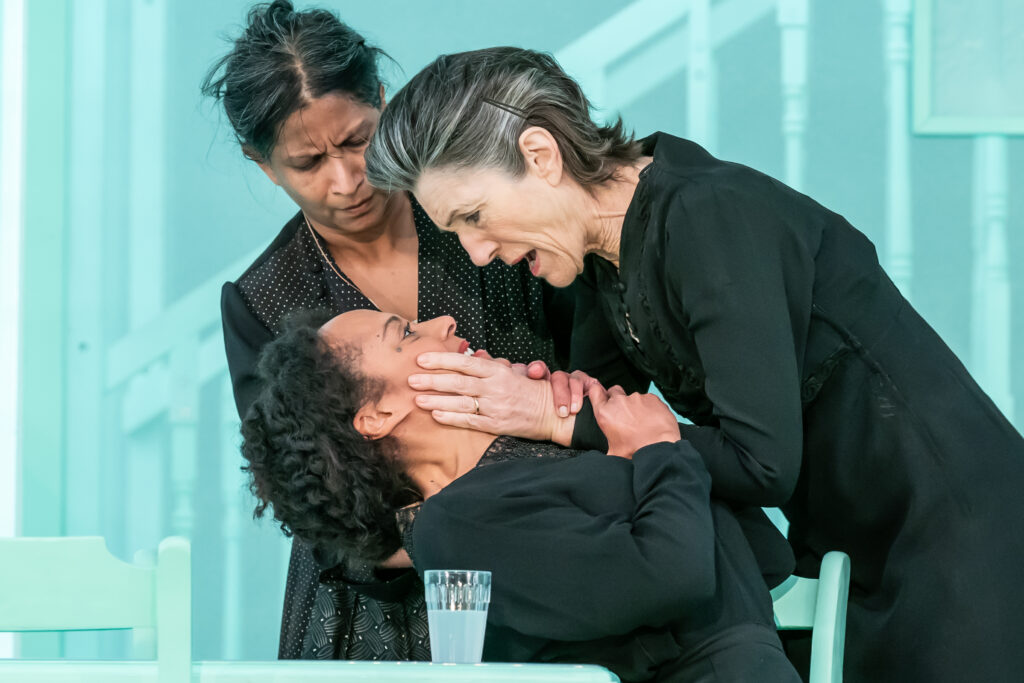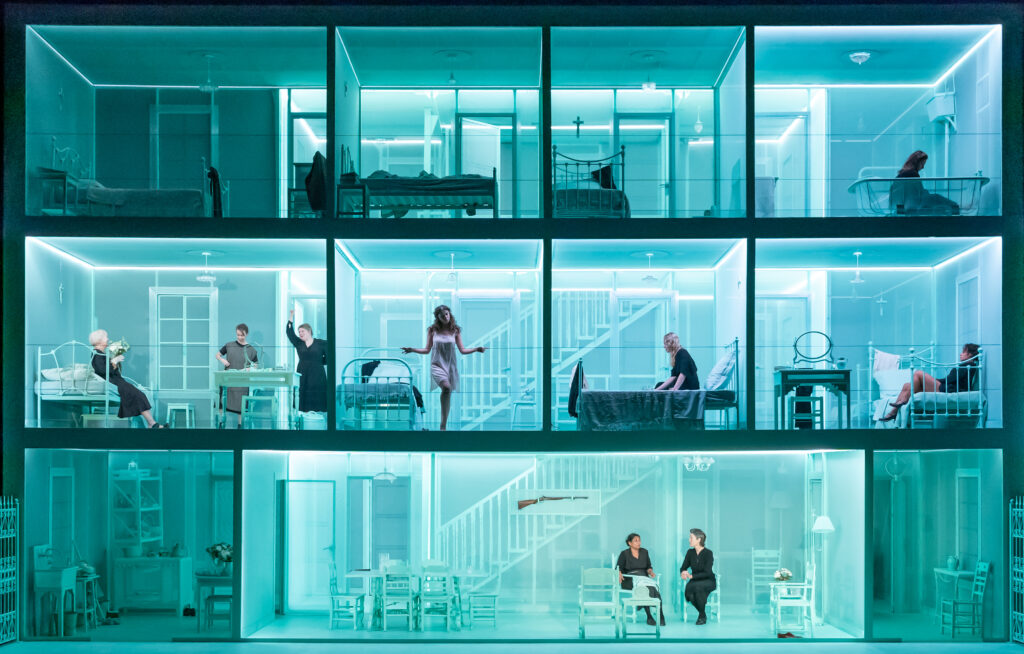Harriet Walter leads first rate cast in revitalised Lorca classic
★★★★

This National Theatre production isn’t for everybody. If you’re familiar with The House of Bernada Alba by Federico Garcia Lorca, you’re going to have to put it out of your mind. Alice Birch‘s version is a devastating dissection of an authoritarian household and the malign influence of men. Rebecca Frecknall‘s production offers some of the finest acting you could hope to see, and not just from Harriet Walter. If the beginning is a little disjointed, messy even, the second half is theatre at its best.
Sometimes you enter an auditorium and the set is already laid out before you. Not on this occasion. Instead you wait for the Lyttelton safety curtain to open. When it does, it reveals Merle Hensel’s magnificent house, filling the giant stage from top to bottom and right to left. It’s on three storeys with seven separate bedrooms and a bathroom on the top two levels, and, thanks to transparent walls, you can see its full depth. So there is no escape, no privacy for the five daughters of Bernarda Alba, we even see one of them masturbating. And that’s very much the dominant theme of this production: Bernarda rules her daughters and believes she knows everything that’s going on.
The complete set including props is a pale green colour, except for a rifle sinisterly centre stage, which is the trigger- no pun intended- for the devastating end. The colour is not only the least distracting you could choose but it provides the starkest of contrasts to the black clothes of the women, whose husband and father has been buried that day. Bernarda declares eight years of mourning to the horror of her unmarried daughters.

At first, as we get to know the household, there is much chatter and gossip from many women who have gathered after the funeral. Bernada says nothing but sits rigidly. She is a woman of few words. Harriet Walter gives a masterful performance in which less is more. She exhibits a cold stare, an imperious pose, and, when she does speak, it is without emotion. Bernada Alba has learned to survive in a man’s world by revealing no weakness.
The daughters are rebellious individuals but this is 1930s Spain and there is no escape for them. So, they are cowed by Bernarda and contain their thoughts, breaking out occasionally as when the oldest puts on makeup or the youngest a bright green dress. They are forbidden to fraternise with men, however Angustias, who is from Bernada’s first marriage, is the only daughter with money, which gives her an escape route. Her wealth has attracted a suitor, Pepe de Romans, and she is due to wed. Her fiance is an obsession of at least two of her sisters who both exhibit a dangerous jealousy. All the women are fearful of and fascinated by men generally, and Pepe in particular.
Spain in the 1930s was a patriarchal society. No doubt Lorca intended his audience to see parallels with an authoritarian society in which the people are forced into conformity, and this is why the play retains such power today. Bernarda Alba, like many in such a situation, does the job of the patriarchy for it by teaching, and expecting, her daughters to treat men with caution and respect.
She makes the house a female bastion against the male-dominated outside world, female but not feminist. ‘Men are capable of anything’ it is said, and there are hints, and more than hints, that men have and do behave despicably.
Her rule is cruel and dictatorial. Toward the end of act one, when one of her daughters does something wrong, the punishment is brutal and disproportionate. The first act ends with a shocking scene in which the house is invaded by a lynch mob chasing an ‘sinful’ young woman.
In Lorca’s original play, we never see Angustias’s fiance. In Alice Birch’s generally superb rewriting of the play, we see him silently moving across the stage in balletic manner. This underlines that he is a romantic fantasy, because we can see that in the flesh he is quite ordinary. Even so, I still prefer Lorca’s idea of him living in the imagination as an invisible presence hanging over the household.
As the play progresses to its tragic end, we see that Bernada is not as all-seeing as she thinks, and that her control is illusory.
The cast is uniformly brilliant. Angustias, the sickly and psychologically damaged eldest daughter, is played with layers of aloofness and vulnerability by Rosalind Eleazar. Isis Ainsworth provides an extraordinarily strong performance as the youngest sister Adela, in love with Pepe, defiant, and with emotions out of control. Lizzie Annis, Eliot Salt and Pearl Chanda are the other three sisters, also excellent. Eileen Nicholas is the senile grandmother who is locked in her bedroom. Thusita Jayasundera and Bryony Hannah are the servants who provide both honest comments and humour.
Rebecca Frecknall, after her recent successes directing Cabaret at The Playhouse and A Streetcar Named Desire at the Almeida, has triumphed again with this forceful production.
The House Of Bernarda Alba can be seen at the National Theatre until 6 January 2024
Paul was given a review ticket by the theatre.
Watch this review on the YouTube channel Theatre Reviews With Paul Seven

